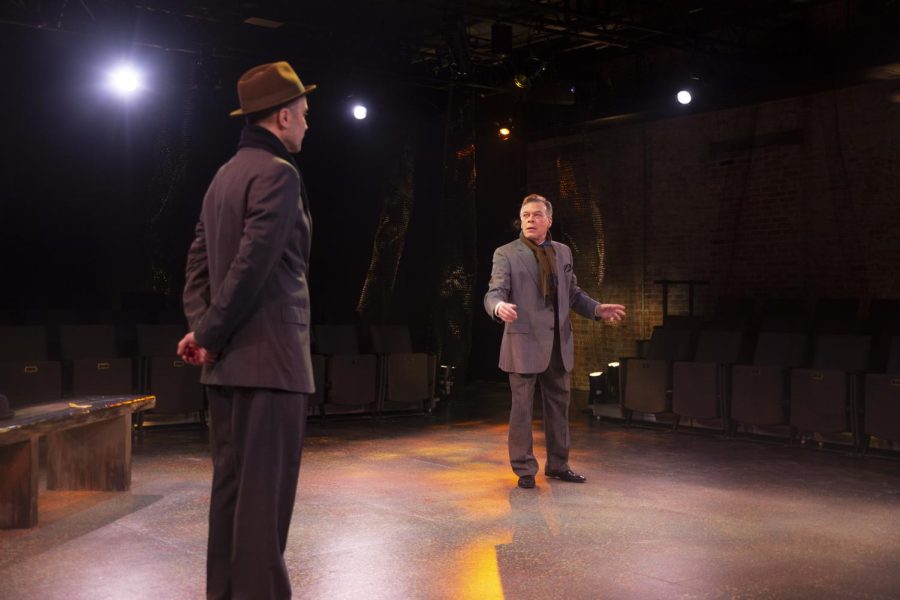Review | Riverside’s ‘A Walk in the Woods’ is a powerful play about human connection and hope.
Riverside Theatre is presenting ‘A Walk in the Woods’ through the beginning of February, a powerful play about interpersonal relationships in the face of tensions and distrust.
Actors Martin Andrews and Tim Budd perform in the final dress rehearsal for the play A Walk In The Woods at Riverside Theatre In Iowa City on Wednesday, Jan. 25, 2023.
January 31, 2023
The Riverside Theatre transformed into a woodland grove in the mountains of Switzerland on the evening of Jan. 27, surrounded by three-dimensional trees of light and chicken wire with a single wooden bench occupying the stage.
“A Walk in the Woods” — which opened at Riverside on Jan. 26 — is a play written by Lee Blessing, a graduate of the University of Iowa whose work tends to focus on interpersonal relationships surrounding social and political issues. The play follows two arms negotiators trying to make a deal between Russia and America.
Andrey Botvinnik, played by actor Tim Budd, was the negotiator representing Russia.
Andrey’s counterpart was the negotiator representing America, John Honeyman, who is played by actor Martin Andrews.
The play is set in the 1980s when the threat of nuclear war between America and Russia heightened worldwide tensions. America had drafted a proposal to Russia to reduce both countries’ nuclear weapons stores.
John and Andrey took several walks in the woods of Switzerland, a nation of neutral ground, over the course of a year to discuss and ratify America’s proposal and its appeal to their leaders.
The play is set in summer when Andrey and John took their first stroll into the woods to conduct their business away from the prying eyes of reporters.
It was clear from the moment the two first spoke to each other that they were opposites. Andrey’s carefree personality clashed with John’s more uptight attitude, causing friction between the two and initially preventing any work from being done.
RELATED: Riverside Theatre’s ‘Will Power’ workshops help high school students learn Shakespeare
Their standoff continued into the fall when Andrey and John reemerged onstage with hats and scarves.
As the play continued, Andrey and John slowly began to reveal more about themselves and how their behaviors reflected their deepest hopes and fears. Andrey, though he seemed secure and comfortable, lost hope in both countries to make any kind of progress and feared the continuous evolution of nuclear war.
Meanwhile, John was insecure about the possibility of failing in his position because he was so optimistic about the future and the power of people to change the war and, consequently, the world.
In the winter, Andrey explained that America’s arms proposal was just too good. Approval is built on trust, which was inevitably impossible for the two countries to have between them.
Finally, the two negotiators reached a conclusion about the proposal in the spring. In this season of growth and rebirth, John admitted that his position had begun to corrupt his outlook with cynicism.
Andrey shared a startling decision, prompting an emotional exchange between the two negotiators that proved just how they had changed over the year.
“A Walk in the Woods” was a beautiful story of human connection in the face of what felt like gridlock and indisputable opposition. It was about hope for the future even when all seems lost.
Thanks to the incredible performances of Budd and Andrews and their ability to bounce off each other so well, the stellar script was brought to life.
The performances were especially impressive during the actors’ more serious monologues, and the lights and the sound onstage helped produce a dramatic effect. The audience could not tear their eyes away because they were too engrossed in the storytelling.
In a world plagued by violence and nihilism, especially in light of the Russia-Ukraine war, this play presented relatable themes of hope and despair.
Riverside will present “A Walk in the Woods” through February. Details of the performances can be found on its website.



